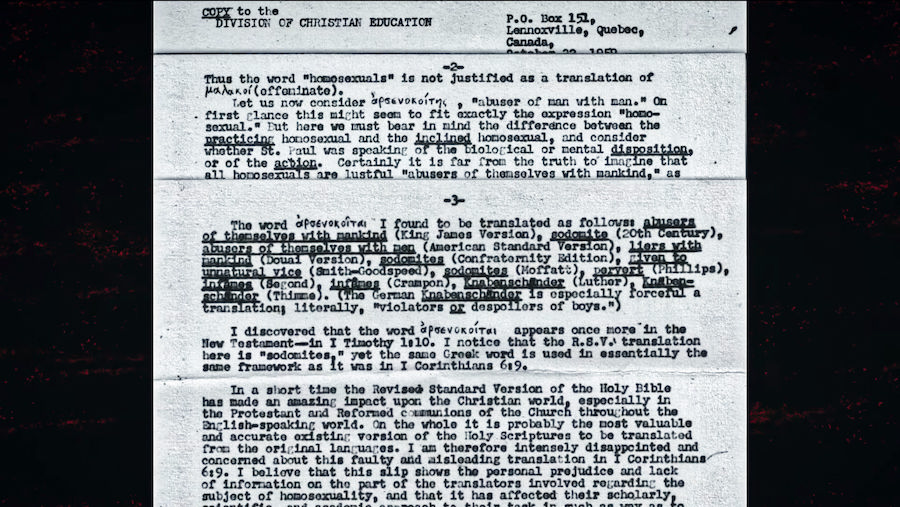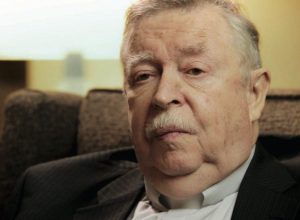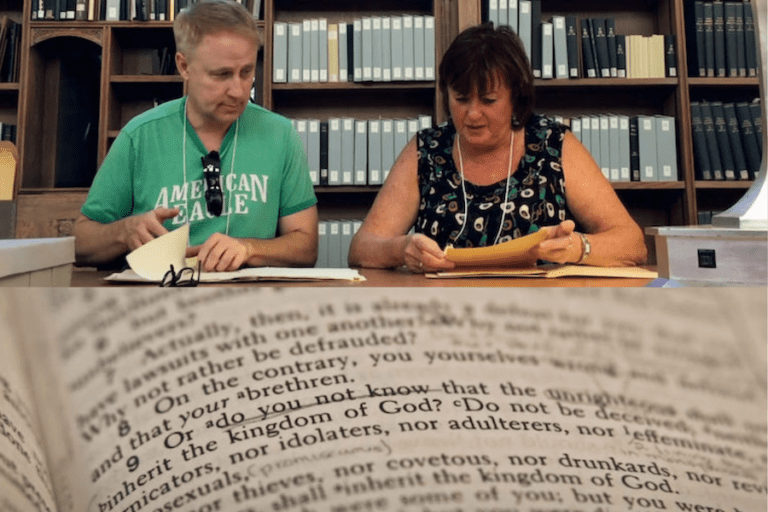Author Kathy Baldock and Ed Oxford, a fan of Baldock’s work turned co-detective, are heads down in research mode at the Yale Sterling Memorial Library in New Haven, Connecticut. They’re deep in the archives, and when I say deep, I mean they’ve already gone through about 60,000 documents. The award-winning documentary 1946: the bad translation that changed culture can make even file browsing fascinating. They are looking for comments on why the word “homosexual” was added to the Bible.
You read correctly. The word “homosexual” was not always present in the Bible. It first appears relatively recently, in the Revised Standard Version (RSV) published in 1946. The RSV translation committee had voted to combine the Greek words malakoi (gentle or effeminate) and arsenokoitai (men having sex with men, usually in an exploitative context) and translate them as “homosexuals”. This has of course had disastrous consequences for 2SLGBTQ+ people. But the RSV was wrong. Using “homosexual” in 1 Corinthians 6:9-10, a verse about sexual assault, was a mistranslation. A mistake.
Returning to the archives, the film captures the moment Baldock and Oxford find the document – a letter dated October 22, 1959 – challenging the translation committee’s use of the word. David, the letter’s author, who omits his last name, makes a compelling argument over five detailed pages. We see the response from the chairman of the commission. Their correspondence continues, rich in critical analyses. The committee leader concludes with thanks, saying he will report it to the team at their next meeting. Years later, when they do, the mysterious David is vindicated as the translation team chooses to remove the word.

But the updated version was not published until 1971. In the meantime, many Bible translators added the word in their publications based on the RSV. The consequences of religious homophobia are evident in the documentary.
One of her main subjects is the filmmaker herself, Sharon “Rocky” Roggio. We also meet his non-affirmative pastor father. Although much of the film is a biblical adventure, the scenes between Roggio and his father, Sal, are difficult to watch. She told me in an interview that she struggled with “loneliness, depression, alcohol and drug abuse” after coming out and being forced to leave home.
However, Roggio’s father is now back in his life. In the documentary, he voices the counter-arguments to the film’s message and personifies a parent simply trying to follow God as best he can. “We wanted people to recognize themselves (and) what’s going on in their family,” Roggio told me.
The documentary refuses to demonize Christians. “Our loved ones, who are our oppressors, (are) victims of bad theology,” Roggio said of the film’s approach. “This is not an attack on anyone’s beliefs. This is a tangible translation error in an ancient text that has great influence in our world. …We have evidence that this was human error.
Learn more about Broadview:
Queer people in many Christian communities have experienced these father-daughter scenes firsthand. Watching Roggio and his father interact, I had to pause the movie to take a few calming breaths. I grew up in an affirming United Church, but I was still too young in similar conversations, with adults who spoke as if they had the Bible and the authority of God on their side. And just like Roggio did when he was a teenager, I too received a letter riddled with so-called despicable passages from the Bible to help me change my strange habits.
Although none of the biblical statements on homosexuality are attributed to Jesus, their weight and authority are undeniable. The crux of the 1946 story is to address the scriptures used against homosexuals, largely through interviews with theological experts, who patiently explain the context of these passages and their true meaning. Coming directly to these passages and learning an affirmative interpretation of them is not only a breath of fresh air – it is life-changing.
The film moves forward, creates tension — Who is David? Will Roggio’s father accept him? – and is generally funnier than a movie about homophobia in Bible translation has any right to be. Unfortunately, the film seems timely because anti-trans rhetoric intensifies in Canadian politics. As Baldock told me: “It’s a question of justice. And justice is a Christian issue.
Baldock’s next book on the subject, Forging a Sacred Weapon: How the Bible Became Anti-Gay, delves deeper into the historical context of the translation error. It was Baldock’s lecture series that inspired Roggio, and in a beautiful symmetry, we hope that Roggio’s film will now attract more readers to Baldock’s meticulous work.
Speaking to Baldock via Zoom, I encountered a natural storyteller. We talked about his book, yes, but we also talked about the hike, which plays a role in this story since it is on the trail that Baldock, an evangelical Christian, gradually asserted himself. On one of her walks in the canyons near her home in northern Nevada, Baldock met her now dear friend Netto Montoya. When Montoya risked coming out as a lesbian to Baldock, it prompted Baldock to begin what is now years of research.
Want to learn more about Broadview? Consider subscribing to one of our newsletters.
Just as Montoya’s courage to come out became the driving force behind Baldock’s work, Roggio’s documentary reminds us how often it is the courage of queer people themselves that push us toward more accepting communities of faith and more assertive.
This was the case for our semi-anonymous writer, David. Through Baldock’s research, we meet him in the film — the Rev. David Fearon, pastor of the United Church of Canada in Nanaimo, British Columbia. “I thought I was called to pastoral ministry despite my homosexuality,” he says in the documentary. After Baldock made him realize the impact of his letter, he realized a deeper truth: “I was called to the ministry because I was gay. »
Fearon died earlier this year, but what a legacy to leave behind. Take the risk of challenging a translation team as a young seminarian, and convincing them? And risk, locked up, doing it alone and in secret? Honestly, this is Heritage Minutes stuff, Canada. The end of 1946 dedicated the documentary to Fearon, “in tender memory”.

And from there, the credits roll. I was surprised to be moved to tears by the thanks from the nearly 2,000 names of those who supported this popular film.
Baldock suggested we go finish making the lamb soup – his hiking partner Montoya was coming that evening, and it’s his favorite. I should have conveyed my thanks for her lighting such a fire under Baldock.
Baldock is an ally in action, writing despite the hate she receives for her affirmative message. “Do you know how much crap I’m going to take for this book, honey?” she said.
I hope not. Let’s help this book and movie change hearts everywhere.
***
Allison Brooks-Starks writes and leads eco-therapy retreats in Edmonton.
This article was first published in Wide viewin the December 2023 issue titled “Affirming Evidence.”
We hope you found this Wide view engaging article.
Our team works hard to bring you more independent, award-winning journalism. But Wide view is a non-profit organization and times are tough for magazines. Please consider supporting our work. There are several ways to do this:
- Subscribe to our magazine and you’ll receive intelligent, timely stories and insights delivered to your door 8 times a year.
- Make a donation to our Friends Fund.
- Give the gift of Wide view to someone special in your life and make a difference!
Thank you for being such wonderful readers.
Jocelyne Bell
Editor/Editor


